

Prefixes and suffixes. Unit 13 REVIEW. Exercise 1Read the text below and think of the word which best fits each gap.
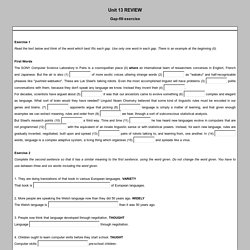
Use only one word in each gap. There is an example at the beginning (0). First WordsThe SONY Computer Science Laboratory in Paris is a cosmopolitan place (0) where an international team of researchers converses in English, French and Japanese. But the air is also (1) of more exotic voices uttering strange words (2) as "wabaku" and half-recognisable pheases like "pushred wablueko". These are Luk Steel's talking robots. Exercise 2Complete the second sentence so that it has a similar meaning to the first sentence, using the word given. 1. 2. Being Bilingual - Breaking News English Lesson - ESL. Bilingualism. Cae reading and use of english. Learning languages. I wanna talk about learning languages.
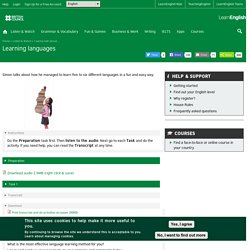
I’ve lived in many different countries, both in Western Europe, Middle East, and now here in Hong Kong. And during all of that time, I’ve learned five or six different languages, to one degree or another. Learnenglish wanna talk about learning languages support pack. The benefits of a bilingual brain - Mia Nacamulli.
Open Cloze. Word Formation - PDF Worksheets - English Vocabulary and Grammar. 9 Big Advantages of Learning a Foreign Language. We live in a hyper-connected, fast-paced world, and things aren’t changing anytime soon.

How can you keep your head above water? You need to be hyper-awesome to survive. That means you’ll have to develop some special advantages to get a boost, help yourself stand out and make you better fit for survival in this crazy, modern world. As our world becomes more and more connected through technological advances, it’s becoming increasingly obvious that learning another language is beneficial for many reasons. Here we present just a few of the many positive side effects of becoming bilingual (or multilingual). CAE - informal letter/email. A LETTER/AN EMAIL (formal or informal) is written in response to the situation outlined in the task.
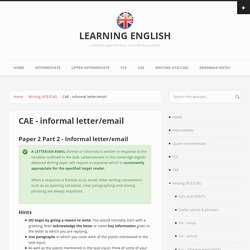
Letters/emails in the Cambridge English: Advanced Writing paper will require a response which is consistently appropriate for the specified target reader. When a response is framed as an email, letter-writing conventions such as an opening salutation, clear paragraphing and closing phrasing are always important. CAE Use of English Part 3: free practice test. CAE Use of English Part 1 (Multiple Choice Cloze) Practice Test. Unit 02. ESL listening for advanced students. Learning languages. I wanna talk about learning languages.
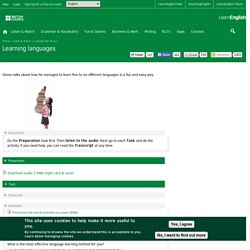
I’ve lived in many different countries, both in Western Europe, Middle East, and now here in Hong Kong. And during all of that time, I’ve learned five or six different languages, to one degree or another. I love learning languages. Not only are they important when you move to a country, I just find them fascinating. Before I came to Hong Kong, I lived in Barcelona Spain for ten years. Other things that helped me when I first moved to Spain, were watching the typical kinds of programs we see everyday on channels around the world. Other types of program that helped me learned Spanish quickly were things like game shows, where the same thing happens. As well as that, I used to pick up the Spanish newspapers. Learning Languages. [ Quiz Script | Text Completion Quiz] Discuss with a partner three ways to learn a foreign language and then explain which one has helped you personally the most.
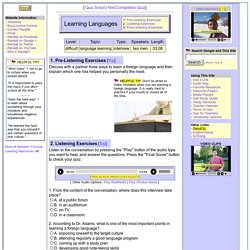
Listen to the conversation by pressing the "Play" button of the audio type you want to hear, and answer the questions. Press the "Final Score" button to check your quiz. [ Other Audio Options: Play RealMedia | Play Window Media ] Listen to the conversation again as you read the Quiz Script and complete the Text Completion Quiz.
Vocab advanced 2010. The Successful Language Learner - Reading Comprehension Exercise. Which is the hardest language? - Reading Comprehension Exercise. People often ask which is the most difficult language to learn, and it is not easy to answer because there are many factors to take into consideration.
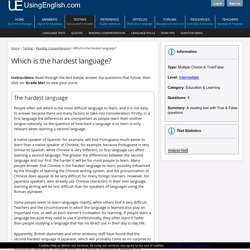
Firstly, in a first language the differences are unimportant as people learn their mother tongue naturally, so the question of how hard a language is to learn is only relevant when learning a second language. A native speaker of Spanish, for example, will find Portuguese much easier to learn than a native speaker of Chinese, for example, because Portuguese is very similar to Spanish, while Chinese is very different, so first language can affect learning a second language. The greater the differences between the second language and our first, the harder it will be for most people to learn.
Many people answer that Chinese is the hardest language to learn, possibly influenced by the thought of learning the Chinese writing system, and the pronunciation of Chinese does appear to be very difficult for many foreign learners. Can we learn a second language like we learned our first? Robert William McCaul, winner (with Marek Kiczkowiak) of the TeachingEnglish blog award, examines the influential ideas of linguist Stephen Krashen, and the implications they have for the language classroom.

If you've ever doubted whether you're a good language learner, then bear in mind that you've already learned one language very well indeed – your first. But this raises an interesting question: can adults learn a second language in the same way they learned their first as children? And if so, what are the implications for the classroom? Stephen Krashen and the acquisition of languages.